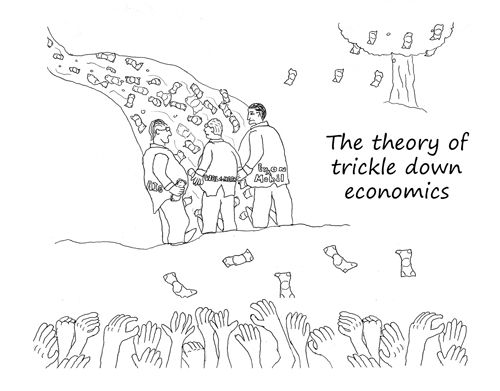When Michael Douglas delivered the famous "Greed is good" speech in the 1987 movie "Wall Street," film critics saw it as a succinct depiction of the brutal Social Darwinism of the 1980s. Not only did the speech showcase the bastardized value system of corporate America, but it also helped audiences see the imperative of reigning in money-hungry Wall Street types such as Michael Douglas's character Gekko. Of course, it was just a movie.
Nevertheless, when discussing economic policy, it becomes apparent that many in this country, including influential politicians, genuinely believe that corporate America and the values it imposes on society are truly as awful as what is depicted in the movie. How else could one explain the Democratic Party's century-long love affair with labor unions? How else could one explain the current Democratic president's refusal to extend the Bush tax cuts? How else could one explain the Democratic-sponsored health care law that involves government in an industry that makes up 16 percent of our GDP?
Small government conservatives understand and recognize that it is not the place of government to make life easier or more pleasant. Its fundamental role is to provide domestic stability and protection for its citizens. Yet time and again, certain policy makers, with the current administration at the forefront, implore Americans to bankroll another stimulus package or bail out. Meanwhile, businesses suffer and fail to compete on a global scale because the president refuses to acknowledge the necessity of keeping the Bush tax cuts in place.
Rather than let business owners keep more of their profits so that they may invest that money back into their businesses, the president would have the government use these funds to pay for farm subsidies we don't need and infrastructure projects we can't afford. All the while, Obama insists that his opponents only care about the rich and are selling out the middle class. What congressional Democrats and the president seem to forget, however, is that "the rich" pay the vast majority of this county's taxes. Given that, it is only logical that any tax cut would benefit them the most. But stoking the flames of class warfare is a far more attractive thing to do when only five weeks remain until the next election and you need to galvanize a thoroughly unenthusiastic liberal base.
Still, doing so is not an example of responsible leadership. The president must stop being beholden to an ideological doctrine that vilifies "the rich" and victimizes the working class. The antagonism between classes has never been as strong in the United States as it has been elsewhere in the world, and for good reason. Americans have remained committed to the belief that it is personal responsibility and an individual's work ethic, not government, that ultimately produces the best innovations. Considering this, it's not at all unreasonable for Americans to expect the president get government off their backs.
Greed is not good, of course. But free market economics, and the competitiveness it encourages, have brought the United States unprecedented prosperity. And that is good. Big government, overregulation and a complex tax code that always demands more of people is not how the economy will regain its strength. The Bush tax cuts won't do it all either, but it's a step in the right direction.
The current president needs to recognize that partisan pandering to his liberal base only hurts our nation as a whole.

